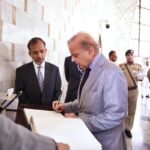NEW YORK, Nov 26 (APP): Pakistan’s State Bank Governor, Ashraf Mahmood Wathra has called India’s shock clampdown on cash an “extreme” step to boost financial inclusion, tax collection and battle graft.
“To my imagination that is a very, very extreme measure,” Governor Wathra said in an interview with Bloomberg economic and financial news service, after the forum it organized in Karachi on Wednesday.
“It’s the enabling environment which has to get better in the economy.”
Indian Prime Minister Narendra Modi demonetized 500 rupee and 1,000 rupee notes in a move announced November, 8, taking out 86 percent of the nation’s currency in circulation.
Bloomberg News pointed out that South Asian countries, including India and Pakistan, are trying to bring more people in the formal economy and stop avoiding tax.
Pakistan is focusing on softer measures to boost financial inclusion, the lack of which is one of the nation’s greatest challenges, Wathra was quoted as saying.
Less than one percent of the population are registered tax-filers and collection is about the weakest in South Asia, according to the Bloomberg report.
There are both cultural issues and the tendency of evading taxes, these two are combined, Wathra said.
“It is just like a mindset of our populations that they like to keep money with them instead of passing it to a bank or a financial institution. This is perhaps in the DNA, which we need to change.”
About a quarter of Pakistan’s adult population has a bank account and the State Bank wants that to double by 2020 and the nation’s more than 14,000 bank branches were not enough, he said.
“That is where the digital internet technology is going to help us in achieving our objective.”
Wathra expects the nation’s growth to be just under the government’s target of 5.7 percent for the year that started in July.
The current account gap is forecast at 1.5 percent of gross domestic product for previous fiscal year, as overseas shipments fell to $21 billion, the lowest level since 2010.
“We have to expand and refine our export model, beyond traditional industries such as textiles, and find new countries and regions to market them to, he said. The present model is not working well enough for us. We have a great potential in services and great potential in information technology which is not being fully realized.”
Bloomberg News said Prime Minister Muhammad Nawaz Sharif’s government is seeking to boost growth and end power shortages by 2018 — when he is up for re-election with the help of China’s pledged $46 billion investments that were announced last year.
With the State Bank of Pakistan’s monetary policy committee holding its final meeting of the year on Saturday, Wathra declined to give an outlook on interest rates.
The central bank has kept the target policy rate unchanged at 5.75 percent in the past two meetings and is expected to keep it at that level on Saturday, according to six of seven economists in a Bloomberg survey. One sees a cut to 5.5 percent, it said.
Having introduced South Asia’s first monetary policy committee this year, the central bank is working toward implementing inflation targeting by 2020, said Wathra. His three-year term ends in April, which would make him the first head of the State Bank to complete a full term since 2009.
“Our economists are researching and considering a few models which will facilitate us to switch to inflation targeting,” he said.
The State Bank is working with the government and planning commission on the ranges as “we can’t start inflation targeting in isolation.”







